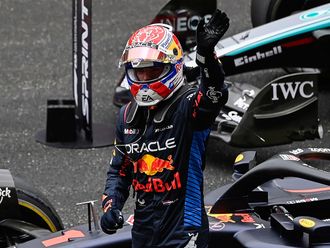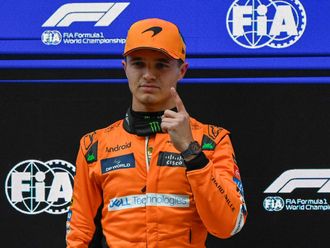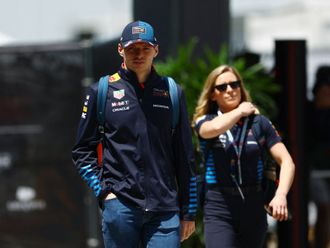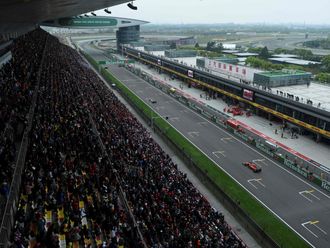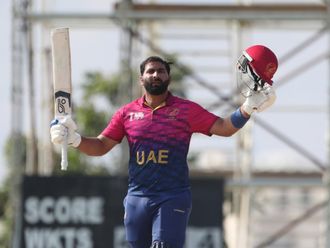When arbiters of legend on the Formula One front ponder on their preference of genius in a sport played out on the edge of survival there is rarely, if ever, a moment’s doubt on the fearless supremacy of Ayrton Senna.
Nearly 20 years ago on May 1, 1994, the seemingly indestructible legend that was Senna was forced to surrender to mortality when he was fatally injured in a crash those of us who were involved in Formula One will never forget.
Two decades later, the enduring memory of this extra-special man, a gifted racing talent almost beyond belief, is as vivid as it was in his pomp when challengers of equal courage if not ability were humbled in his wake as he shyly accepted outpourings of praise so freely heaped upon him.
A week or two before his fateful accident at a tragedy-hit Imola in the San Marino Grand Prix that also claimed the life of his friend Roland Ratzenberger, I had a one-to-one with the Brazilian, who was then struggling to be as masterful in a Williams, as partner to Damon Hill, as he had been with McLaren as three times the world champ.
We knew each other slightly. He had been a near neighbour of mine in a wealth-belt area of Surrey, 15 miles from London, opposite the Sandown Park horse race track and dubbed the UK’s Beverly Hills. He spent most of his spare time flying model helicopters and planes.
My interview with him was memorable for his overwhelming modesty despite his renowned genius and dash and daring behind the wheel of a 200-miles-an-hour missile of a car in a melee of equally fiercely committed drivers not prepared, just like him, to surrender one inch of track. All of that and his religious devotion often to be seen when, sitting in his first-class seat on an intercontinental flight, he would have his head buried in a Bible.
As he revealed: “I am able to experience God’s presence. And I find peace in going to church on my own. My devotion gives me great self-belief and no wound, mental or physical, is deep enough to shake my composure or force me to doubt any decisions I make on or off the race track.”
That soaring level of self-belief had him involved in numerous fall-outs and spats, sometimes with punches flying, with teammates and rivals alike and his tiffs, on track and off, with the likes of Irish cheeky chap Eddie Irvine, 1992 world champion Nigel Mansell and, particularly, his hate-figure Alain Prost, are part of grand prix folklore.
The immeasurable difference between him and the rest is and was impossible to evaluate: His victory in the European Grand Prix at a rainswept, gale-blown and drenched Donington Park in the Midlands of England,with overtaking manoeuvres so bold they made me wince, was quite the most astonishing achievement in Formula One I had ever seen. It was a race that forever ranked him as a driver of exceptional quality and determination even when dangers lurk along every metre of treacherous track. A masterclass of overtaking with Michael Schumacher, Damon Hill and Prost all despatched with ruthlessly calculated coolness.
It was a display of daring and immaculate control still talked about and universally admired in F1 circles and, with perhaps the merest handful of exceptions, has rarely been equalled or surpassed.
To have sadly permitted his astonishing exploits to be cast into the memory boxes of those of us fortunate enough to be around at the time of his mastery or to be merely imagined and falling far short of the reality, would have been a dreadful case of careless neglect.
And a deservedly highly acclaimed Hollywood movie, now on general release, about the hero – and entitled ‘Senna’, with straplines like “No Fear”, “No Limits” and “No Equal”, is unmissable. If it comes to a cinema near you go for it.
Much of the spectacular footage has never been seen before. The Senna family, as anxious to preserve and promote the great man’s reputation, readily granted Universal Pictures permission to go ahead. And F1 ringmaster Bernie Ecclestone eagerly made available the historic content of his archives. The result is a masterpiece. A treasure for grand prix fans, Senna followers or not.
The usual documentary facet of talking-heads interlaced with footage has been discarded and comments and contributions from the star names, drivers or managers, are played as audio-only. The real power show is the action and Senna’s unforgettable attitude.
It is, I have to confess, a classic, three-part offering with a continuity of his rise to the top and his ferocious confrontations with Frenchman Prost, his confrontations on the F1 political scene when he was at the top of his game and, heart-breakingl , his tragic death when his helmet was pierced by flying metal in that crash at Imola.
By then, in 161 races, he had amassed three world titles, two second places, one third and three fourths from 41 grand prix victories, 23 runners-up spots and 16 thirds with 65 pole positions.
Ron Dennis, Senna’s boss at McLaren and his devoted mentor, not always seeing eye to eye, was involved in the making of the movie. It wasn’t shown, but he and Senna went heads-or-tails in a coin toss-up to settle a dispute over the driver’s massive multi-million-dollar salary. Senna, as ever, was the winner.
Dennis, now back in F1 after a short absence heading McLaren’s commercial car business, says: “The film is an emotional one, extremely well done and accurate. I am sure the vast majority will be moved by it. The most important question is: ‘Is it a faithful and fitting tribute to the man both as a human being and as a fantastic motor race driver with so many memorable achievements that you can hardly count them all? My answer is yes, yes!’.


